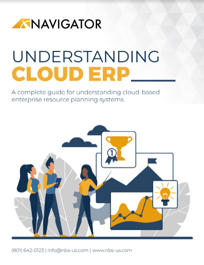- Solutions
- Why Cloud ERP?
- SAP S/4HANA Cloud Public Edition
- SAP Business ByDesign
- SAP Business One
- ERP Integrations & Extensions
- ByDesign vs. Business One
- Industries
- Services
- Resources
- Company
- WATCH DEMO
Search
Cloud ERP is a rapidly growing approach to enterprise resource planning (ERP) that makes use of Software as a Service (SaaS) business model to provide companies with more flexible business management solutions. Readily scalable, add new users and functionality – all without the need for expensive IT resources. The SAP ERP Solutions delivered by Navigator Business Solutions provide predictable pricing, seen as an operating expense, not a capital expense. All so you can focus on your business growth – and not on IT and back office processes.
ERP is an industry term for the broad suite of completely integrated solutions that help businesses manage the central functions of their business such as purchasing and inventory management. SAP applications SAP Business One, SAP Business ByDesign, and SAP S/4HANA Cloud Public Edition, go well beyond the basic core functions of accounting and inventory, delivering a complete, robust suite covering all aspects of business management including Human Resources, Financials, Analytics, Supply Chain, Project Management, CRM, and more.
The industry is moving quickly to cloud computing as it provides a greater opportunity for businesses to completely transform how they use and pay for information technology. For example, cloud-based (SaaS) ERP applications eliminate the need for a business to purchase additional servers and storage hardware and maintain them on-site which, in turn reduces operational expenses.

SAP ERP solutions allow fast-growing, mid-market businesses and subsidiaries scale without the complexity.
With more and more applications and solutions moving to the cloud, it is more than just a viable option for your business. But is it safe? The short answer, it can be remarkably safe. To see why visit the SAP Trust Center for more info on cloud performance, security, privacy, and compliance.
Essential to Cloud ERP systems is a shared database that supports multiple functions used by different business units. That allows employees in different divisions to access and rely on the same information for their specific needs. And with Cloud ERP this is accomplished without requiring extensive (and often expensive) on-premises servers and storage.
Key Differences Cloud ERP Systems Offer:

A complete guide for understanding cloud-based enterprise resource planning systems.